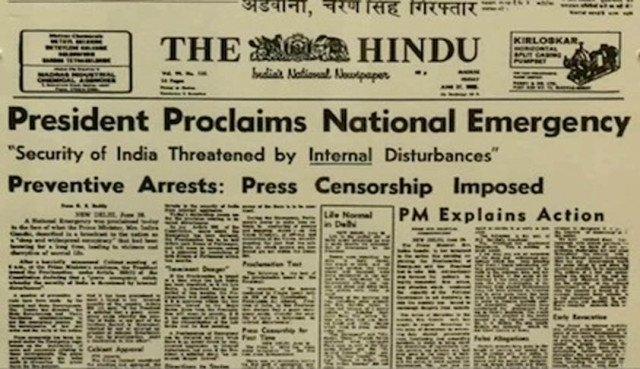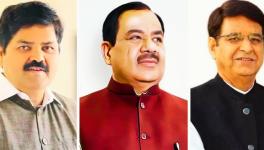Reflections on Emergency and Press Censorship Today

It is now de-facto Emergency and an undeclared press censorship in large sections of the print and TV networks, and many websites in the country. The Press Information Bureau stands virtually redundant. The Central Press Accreditation Committee stands truncated, and the Press Council of India is hardly anything more than a lottery of vested interests, toothless and lopsided. A carrot and stick policy towards the media and media organisations has begun in right earnest. The purpose is to crush dissent. The hit list of journalists killed and attacked goes on increasing. Shujaat Bukhari the editor of ‘Rising Kashmir’ and formerly of The Hindu was shot dead on 14th June. And the Kashmiri journalist in general is reporting under increasing pressure. In fact, just a few days ago a BJP big wig, Chaudhury Lal Singh issued a not insignificant threat asking journalists there to mend their ways over the reporting of the Kathua rape and murder. Some news websites are threatened and a new media scene has emerged with corporates in the saddle in a new quid pro quo between the government and the corporates which includes bagging of new TV channels and of course leading to the curbing of dissent and reportage of dissenting voices.
Indeed, the promulgation of Emergency on June 25, 1975 followed by press censorship, did constitute a dark chapter in history of press in free India. The period had its immediate and long-term repercussions for the press. The moot question today is how far have the lessons been learnt by succeeding governments and the press? In fact, while in the earlier years, dark shades of press censorship were indeed hovering over the country, there were also some periods of resistance too, when the press even imagined an adversarial role for itself. Darker shades were visible during what was a BJP interregnum in its previous government under Atal Bihari Vajpayee, but now more dangerously, new forms of suppression have been invented. The press today is caught in new forms of press monopoly with major industrial houses directly entering the all spectrum media fray.
Read More: Emergency: Then and Now
First, a bit of flash back into the past. It was the censorship of 1975, which showed how the press at large became a tool in government hands. News was moulded purely to serve the party in power and its leader and the ministry of information and broadcasting became a virtual caricature of what the Hitlerian Germany’s Information Minister Goebbels had set up. Here are some examples, as the Shah Commission of Enquiry had pointed out: guidelines issued by the Chief Censor even exceeded the scope of Rule 48 of the Defence and Internal Security of India Rules insofar as they prevented editors leaving editorial columns blank or filling them with quotations from great works of literature or from national leaders like Mahatma Gandhi or Rabindranath Tagore. In practice, censorship was utilised for suppressing news unfavourable to the government.
PRESENT SCENARIO
The press today, often without any justifiable reason, is sought to be gagged by the executive, suppressed by the legislature, silenced by the judiciary or muzzled by motley pressure groups. It is a hangover of the Emergency and continues from time to time for it is an easy victim of government's wrath.
The Emergency undoubtedly left behind it’s shades and censorship, its hangovers and residues. Journalists for a while, however, found themselves more united to fight for their rights and opposition to the Bihar Press Bill, the Karnataka Press Bill and the J&K Bill were a few instances. In some cases, Delhi showed the way on how to resist. Some all-India joint movements yielded dividends.
Today the situation is changing, some of these bodies who lead the struggles on these issues are kept out of institutions they helped make functional. It is a matter of record how the Press Council , the Central Press Accreditation Committee and the State Accreditation Committees have been packed with ‘yes men’ of the government. In some ways targeting of some journalists bodies associated with various struggles has begun with reports of bodies selectively being invited for decision making and even getting notices for payments at market rates.
PREVIOUS BJP PERIOD
In the period of previous right wing BJP government (1999-2004) however, one saw another facet when newspapers were sought to be muzzled either by ham handed attempts or by black mail or by direct threats and in many cases by a carrot and stick approach. In fact, it was this approach which was perfected during the previous BJP-led NDA regime. It was controlled by unofficial means where wily BJP spin-doctors perfected a quid pro quo policy and became selective in denying access to information.
From Tehelka to Outlook to the arrest of Iftikar Gilani, one saw this approach. The rise of papers like The Pioneer tells the other part of the story. And the India Shining TV shows, mixed with religious mumbo jumbo, tell the story during the Atal led government period.
It is a matter of record, then that unfair labour practices in the media like hiring of journalists on contract, has also taken a heavy toll and new forms of censorship were emerging. The former Press Council Chairman P B Sawant agreed with many organisations of scribes on the dangers of contractual journalism to press freedom. He gave a ruling that contracts could constitute a danger to freedom of the press and journalists. He also made a case for a media council supported by various media organisations and finally had to leave the Press Council under pressure from newspaper barons, national and international. Contracts in various forms and guises have today helped curb dissent and prevent democratisation of the media.
Cross media ownerships and increasing Government interference in Prasar Bharati, Doordarshan and even in national news agencies have made freedom of the press a mockery.
NEW ‘INFORMATION IMPERIALISM’
Many years ago, it was acknowledged that in US,step by step, a new system of information imperialism was taking root. Years ago, Rupert Murdoch became the world’s “most honoured Star entertainer”. Recognised officially by then US President George Bush for giving a super information propaganda edge to Bush and Blair and their allies’ invasion of Iraq and the deceitful hunt for illusive weapons of mass destruction. His information conquests, of course, then became diverse with India, China, and others in the news kitty. Today in India, the latest sting shows how the corporate world and the government and select media are having their finest honeymoon. Paid news came out in phases in the Press Council years ago and now has reached new heights and covers even in public realm.
In sum, since the Emergency and Press Censorship period, clear facets can be discerned. However unlike the past, there has been no Press Commission or Media Commission, in view of the expanding media bazaar with international linkages. Add to this the shrinking journalist and devalued editor and contract worker amidst crumbling small and medium papers, cooperatives and trusts. The BJP government would not concede this demand because its findings could have been embarrassing to it. The Congress in its previous period went back to its old game of “under consideration and active consideration”.
NEW CORPORATES FOR OLD
The Cobrapost sting investigation has recently exposed the deep rot which has afflicted major sections of the media, both print and television. It involved 25 media organisations, including major ones like the Times of India, Zee TV, India Today, Hindustan Times, ABP News, Jagran Group and others. The sting operation involved a reporter of the Cobrapost posing as an `acharya’ belonging to a sangathan purportedly connected to the Sangh. The `acharya’ approached the media owners and executives with an offer of hundreds of crores of rupees for an advertorial campaign to advance the Hindutva agenda and in the final stage to create a communal polarisation. The alacrity with which many of the media houses accepted the deal and offered to carry it forward reveals the way corporate media has compromised all ethics and journalistic integrity to put out paid news and conduct a disinformation campaign. In fact, what the Cobrapost investigation reveals is the open allegiance declared by some top media executives and owners, to the ruling BJP-RSS combine. From the advent of the Modi regime till now- the fusion of big business and Hindutva and the media has shown a quantum jump.
Flashback
Many years ago, way back in 1988, The Editor’s Guild brought out a report ‘Carrot and Stick’ to show the plight of the majority of journalists. It really requires an update today. The plight of mofussil correspondents, freelance journalists, part time journalists and stringers is indeed abysmal. What is happening today is that over 20% of the confirmed employees left in the newspaper industry lost their jobs in the past 3 years while fighting for their due wages under the wage board and are now on the road. Many are fighting legal cases for their statutory dues, with managements insuring that they are now outside Delhi for labour law purposes which has made litigation all the more difficult outside Delhi.
It is not so well-known that ever since he became Prime Minister in May 2014, Modi has been campaigning for the 2019 general election, an unprecedented Rs. 4,343-crore budget has been earmarked for publicity by his government; 90 percent of corporate donations went to BJP (Nissim Mannathukaren, The Hindu, June 7, 2018) Recent State elections show fresh trends and jingoism on increase and for this a tamed media is a must.
Recently the reconstitution of the 13th Press Council of India (PCI), and the Central Press Accreditation Committee (CPAC), which grants accreditation to representatives of various news media organisations at the headquarters of the Government of India, has some ominous pointers. Further, in the new Press council of India, a pliant chairman, sings praises to press freedom while exhorting the press to behave itself.
Incidentally, it was the Countercurrents website on June 25, 2018 which brought out the story of timidity of some RSS persons during Emergency. It recounted the days of Emergency - when RSS surrendered to the repressive regime of Indira Gandhi, assured her and her son Sanjay Gandhi, to enforce faithfully the draconian 20-point programme announced by the Emergency regime. The article states that despite all this betrayal thousands of RSS cadres continue to get monthly pension for persecution during Emergency. The BJP ruled states like Gujarat, Madhya Pradesh, Rajasthan and Maharashtra decided to award a monthly pension of Rs 10,000 to those who were jailed during the Emergency period for more than a month and Rs 5000 to those who were jailed for less than a month. This rule took care of the financial interest of those RSS cadres who might have submitted mercy letters completing only one or two months’ jail term. For securing such a fat pension there was no such condition that the beneficiary should have been in jail for the whole period of the Emergency.”
In conclusion, it can be said that real freedom of the press today is indeed a chimera. Successive governments have sought to muzzle the press. There have been attempts made by several governments to muzzle or at least whittle down press freedom and curb free flow of ideas as they would aid the struggle against the very system. Today without any Emergency dissent is being muzzled. However unlike the past more and more struggles against it have begun. It is true that many struggles are being blacked out. However the contours of united struggles are on the increase just as various struggles are being crushed.
TAIL PIECE
In Gujarat, posted for part of the emergency, this correspondent met several underground personalities. One such character was a fairly well read, former MP of the BJP. Another correspondent joined us in day to day interactions. The MP was paranoid and feared arrest any day. “Should I sign the twenty point programme” he often asked. ‘Wait and watch’ we always said. Sometimes he asked “Can I stay with your uncle in Kumaon?” We also noticed him being watched and cautioned him in a restaurant. It was quite easy recognizing him despite the mod goggles. He suddenly left one day. A senior police officer, a college contemporary; rushed to meet me when I came to Delhi in between. Coolly, he asked me, “Give me just one bit of information - where is George Fernandes? It would help me in getting a promotion”. We were discussing college chums and I was a bit curt. ‘Even if I knew I would not tell you,’ I said sharply. One fine evening seeing the ugly situation in general, I typed perhaps my third resignation, with the words, “I resign on grounds of political conscience “. To my surprise I was soon called back to Delhi, with some colleagues helping in this short term reprieve.
Get the latest reports & analysis with people's perspective on Protests, movements & deep analytical videos, discussions of the current affairs in your Telegram app. Subscribe to NewsClick's Telegram channel & get Real-Time updates on stories, as they get published on our website.
























